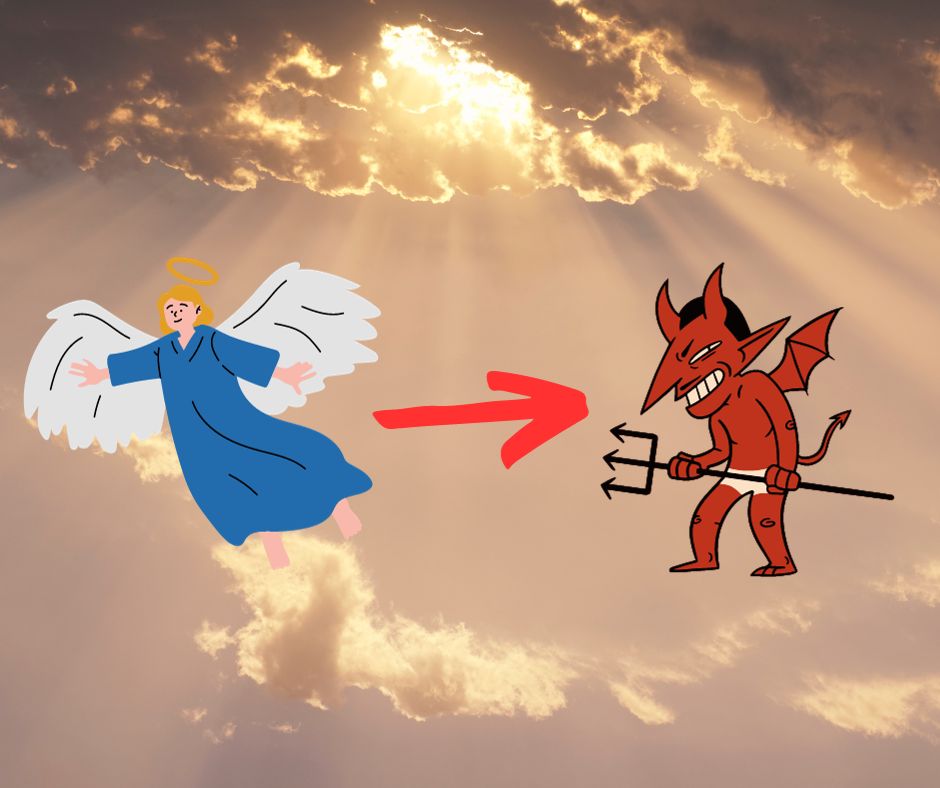 Hello Mr. Minton
Hello Mr. Minton
I want to ask about a certain topic that’s been on my mind. A friend of mine who is an agnostic shared to me that one reason she is hesitant with Christianity is due to fallen angels. She thinks it is what makes our belief system fishy. If angels are the workers of God and encounter Him more directly and are much more powerful and intelligent than humans, surely they know much clearly the consequences of rebelling. They would know they stand no chance against an all-powerful God and meet eternal punishment. And yet in our religion, we have fallen angels who did rebel against God. My friend thinks this is unlikely to happen, and so fishy. And she also says it makes it seem instead that the Christian God might just be some powerful (but imperfect) being who might be making up lies and used a sloppy excuse for explaining “fallen angels.”
This is my first time hearing someone having this reason for being agnostic. Most skeptics I know have the usual philosophical problems/arguments which I have grown used to. I did not expect this so I don’t really know what I should have said. I don’t believe her of course but what she said has been on my mind. It bothers me a lot how I keep thinking about it and I’m afraid it might lead me to doubts. I suffer from scrupulosity Mr. Minton, so I’ve been very stressed and emotional about it. I can’t stop thinking about it and I am plagued with thoughts that I might end up doubting God, and I’m scared it might lead to blasphemy. Maybe your words on what my friend said may help me.
Thank you Mr. Minton. I’ve been following your blog for months and I really like your posts. Your articles helped me believe in free will and molinism. Thank you for everything.
Your reader, Ruth
 I agree that it seems odd to think that the angels, who both know God and know about God far better than we do, would be so stupid as to try to overthrow him or defeat His purposes. But it also seems stupid to me to think that criminals can escape police officers during high speed pursuits. Not only is there a long record of all of them ending with the police officers catching the bad guy (because of some spike trap, or the guy drove down a dead end road and had to get out of his vehicle), but they are also surely aware that there’s no where they can hide with a police helicopter overhead. Yet people still try to evade the police. The point here is that bad persons do stupid things when they should know better.
I agree that it seems odd to think that the angels, who both know God and know about God far better than we do, would be so stupid as to try to overthrow him or defeat His purposes. But it also seems stupid to me to think that criminals can escape police officers during high speed pursuits. Not only is there a long record of all of them ending with the police officers catching the bad guy (because of some spike trap, or the guy drove down a dead end road and had to get out of his vehicle), but they are also surely aware that there’s no where they can hide with a police helicopter overhead. Yet people still try to evade the police. The point here is that bad persons do stupid things when they should know better.
“Well, a lot of it comes down to what I call, ‘evidential insufficiency’. Every criminal trial illustrates answers an important question: At what point does a jury think it has enough to make a decision? We have to remind every jury that they’ll always have unanswered questions; in every case. I’ve never had a case where there wasn’t a series of unanswered (and even unanswerable) questions, because you’re never going to be able to answer every question; I don’t care how long you look at the case.
“We ask jurors to make a decision in spite of those unanswered questions. As a matter of fact, that’s why the standard of proof in criminal trials is not ‘beyond a possible doubt’; it’s ‘beyond a reasonable doubt’. If the standard of proof was “beyond a possible doubt,” we’d never convict anyone. There are lots of things we believe, even though we don’t have every possible piece of evidence to justify my belief. How can I be certain my car won’t explode when I turn the key? It’s happened to others, and it’s certainly possible it could happen to me. But is it reasonable? If you lived on the basis of your possible doubts, you’d be immobilized by fear and uncertainty. That’s why the standard of ‘beyond a reasonable doubt’ is good for us, even as Christian believers.
We need enough evidence to infer the most reasonable inference, but no more. We can’t answer every question about God. Do you really think, as a mere mortal, you can know everything there is to know about the nature of God? I doubt we’re ever going to have complete, robust answers on this side of Heaven. But we can still move, we can still act, we can still make a decision for Christ, even though we don’t have every possible answer, because guess what? No one has every possible answer, regardless of worldview.”1
I hope I was able to help.
NOTES

If you have any questions about Christian theology or apologetics, send Mr. Minton an E-mail at CerebralFaith@Gmail.com. It doesn’t matter whether you’re a Christian or Non-Christian, whether your question is about doubts you’re having or about something you read in The Bible that confused you. Send your question in, whatever it may be, and Mr. Minton will respond in a blog post just like this one.
Share this:
- Share on Facebook (Opens in new window) Facebook
- Share on X (Opens in new window) X
- Print (Opens in new window) Print
- Email a link to a friend (Opens in new window) Email
- Share on Pinterest (Opens in new window) Pinterest
- Share on Reddit (Opens in new window) Reddit
- Share on LinkedIn (Opens in new window) LinkedIn
- Share on Tumblr (Opens in new window) Tumblr
Discover more from Cerebral Faith
Subscribe to get the latest posts sent to your email.




